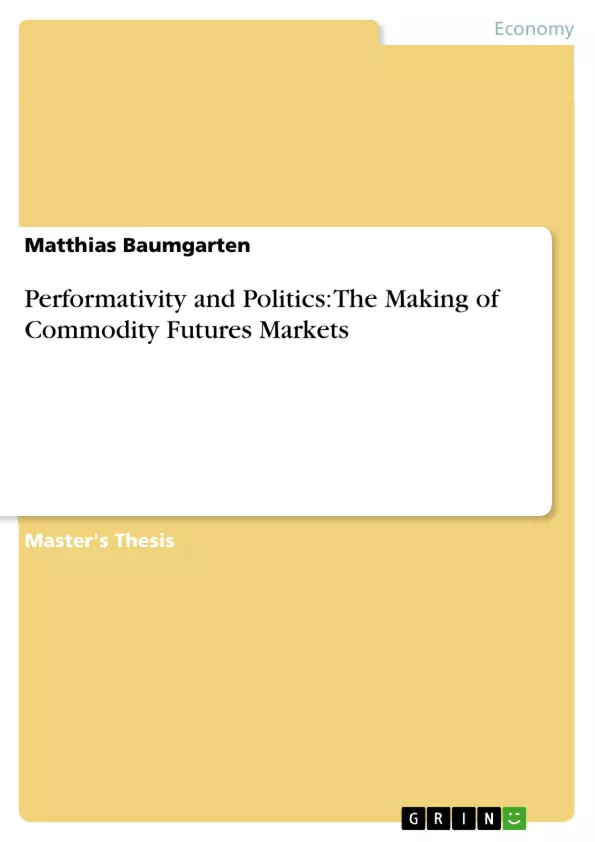In this work I analyze commodity futures markets (CFMs) in order to shed light on the debated relationship between neoclassical economic theory and real-world markets. I show that CFMs clearly reflect a number of neoclassical aspects, but its asocial assumptions mean that the theory fails to explain how these came to be realized. Performativity theory, despite itself neglecting the ‘political’ factors of agency, power and distribution to a certain extent, proves to be a suitable alternative explanatory approach. Its idea of economic theory as a ‘blueprint’ can be recognized in conscious steps during the formation of CFMs, which increased the fit of these markets to the neoclassical ideal. Agency and power played a substantial role in shaping performative processes, which led to an approximation of market equilibrium and corresponding positive distributional effects. These outcomes proved to be instable, however, as the entry of big investors in the wake of the current ‘financialization’ of CFMs had disequilibrating consequences. The resulting instances of counterperformativity shifted the markets away from neoclassical theory and led to adverse distributional impacts.
Inhaltsverzeichnis (Table of Contents)
- Abstract
- Introduction
- From Neoclassical to Futures Markets
- Neoclassical Market Theory
- Beyond Neoclassical Markets: The Problem of Politics
- Commodity Futures Markets: Approximating the Neoclassical Ideal
- Performativity and Commodity Futures Markets
- The Making of Commodity Futures Markets: Performativity in Action
- From Blueprint to Market: The Rise of Futures Trading
- The Political Dimensions of Performativity
- Financialization, Counterperformativity, and the End of Equilibrium
- Conclusion
Zielsetzung und Themenschwerpunkte (Objectives and Key Themes)
This work aims to examine the relationship between neoclassical economic theory and the real-world operation of commodity futures markets (CFMs). By analyzing the historical development of CFMs, it seeks to understand how aspects of economic theory are realized in practice, the role of economic theory in their production, and the distributive impacts that result.
- The relationship between neoclassical economic theory and real-world markets
- The concept of performativity and its application to market formation
- The role of agency and power in shaping market outcomes
- The impact of financialization on commodity futures markets
- The implications of market dynamics for distribution and equilibrium
Zusammenfassung der Kapitel (Chapter Summaries)
The introduction presents the central question of the work: how do neoclassical economic theory and real-world markets interact? The author introduces the dominant neoclassical market conception and its shortcomings, particularly its lack of attention to political factors like agency and power.
The second chapter delves into the origins of neoclassical market theory and its core assumptions, highlighting the concept of market equilibrium achieved through the rational decisions of utility-maximizing agents. The chapter further discusses the limitations of this theory in accounting for real-world market complexities.
The third chapter explores the concept of performativity, which posits that economic theory can act as a 'blueprint' for market formation. The author discusses different approaches within the performativity literature and emphasizes the importance of considering agency, power, and distribution in analyzing market dynamics.
The fourth chapter applies the insights from the previous chapters to the development of commodity futures markets. It examines how these markets were shaped by performative processes, demonstrating how economic theory influenced their creation and the role of agency and power in shaping market outcomes.
The fifth chapter investigates the impact of financialization on commodity futures markets, exploring how it has led to a loss of fit with neoclassical assumptions and contributed to market instability and distributional consequences.
Schlüsselwörter (Keywords)
The main keywords and focus topics of this work include commodity futures markets, performativity theory, economic theory, political economy, equilibrium economics, financialization, economic history, and wheat markets.
Frequently Asked Questions
What is performativity theory in economics?
Performativity theory suggests that economic models do not just describe markets but actively shape them by acting as a 'blueprint' for their construction.
How do commodity futures markets (CFMs) relate to neoclassical theory?
CFMs were designed to approximate neoclassical ideals like market equilibrium, but the theory often ignores the political and social factors required to achieve this fit.
What is "financialization" in the context of CFMs?
Financialization refers to the increasing entry of large financial investors into commodity markets, which can lead to price instability and a shift away from equilibrium.
What are the distributional effects of futures trading?
While efficient markets can have positive effects, instances of counterperformativity and market shifts often lead to adverse distributional impacts for participants.
Why does the neoclassical model fail to explain market origins?
Because it relies on asocial assumptions and neglects the role of agency, power, and political dimensions in the actual making of a market.
- Quote paper
- M.A. Matthias Baumgarten (Author), 2011, Performativity and Politics: The Making of Commodity Futures Markets, Munich, GRIN Verlag, https://www.grin.com/document/204036



